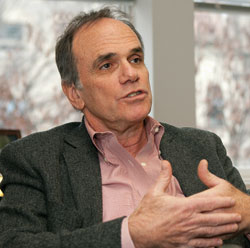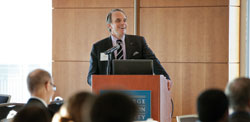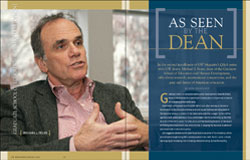As Seen by the Dean
In the second installment of GW Magazine's Q&A series with GW deans, Michael J. Feuer, dean of the Graduate School of Education and Human Development, talks about research, international comparisons, and the past and future of American education.
Graduate School of Education and Human Development Dean Michael J. Feuer is determined to make American educators competitive in a world of increasing global enterprise.
Dean Feuer, who joined GSEHD in the fall of 2010 after serving as the executive director of the Division of Behavioral and Social Sciences and Education in the National Research Council of the National Academies, is eager to help define agendas both global and local. It is a comfortable role for a man who, as the first director of the NRC's Center for Education and the founding director of the Board on Testing and Assessment, was instrumental in shaping the National Academies' prominent role in education policy.
GW Magazine sat down with Dean Feuer to discuss some of his initiatives, which also include strengthening GW's already-powerful ties with the D.C. public schools and playing an increasing role in shaping education policy across the country.
Q: There is an argument that the educational "crisis" in America is too prominent in the national rhetoric—that political discourse about our "failing schools" actually contributes to failures in the educational system. Are there reasons to be cautiously optimistic about the state of American education?
A: We are facing some new and significant challenges in terms of the quality of our education system. We have faced similar challenges all through American history, and one of the virtues of the American system has always been its agility and its capacity to respond. On the one hand, I think all the talk about how wonderful things used to be and how it's now all going you-know-where in a handbasket is overstated. But that should not lead us to be complacent.
For example, on international comparisons of student achievement, we are currently not doing as well as many people, and including myself, would like. At the same time, I don't think that those measures are the principal determinant of our nation's overall educational or economic capacity. A lot of the successful "Americanization" of the 30 million immigrants who arrived in the United States at the beginning of the 20th century is attributable to the work of our public schools. And although we don't have achievement score data going back to that era, it's plausible to suggest that had there been achievement testing on a large scale back then, we would not have necessarily performed at the highest levels. But we were making a fundamental choice: trying to absorb new immigrants and to be an inclusive educational system.

Jessica McConnell Burt
The quality of American schooling always has been a function of its inclusiveness, and therefore the relative standing on so-called "objective measures" of achievement is not the key indicator of success. The key indicator is the capacity and willingness of the system to embrace an ever-changing, heterogeneous population. And the payoff for that was a remarkable advantage in quality of life in the United States.
But we now are at a very critical moment. There's a lot of fearmongering about the failure of our system to produce a sufficient number and a high enough quality of scientists and engineers. We should learn from what's going on in other countries and fashion policy initiatives that sustain our inclusive ethic and build our capacity for higher achievement. One of the great ironies is that we are looking at measures that rank U.S. education performance as relatively weak compared to certain places, such as Finland and some "Asian tigers." But if we believe that those measures are actually picking up on something significant, then why, in response to that, is the U.S. education reform agenda 180 degrees away from the countries that are outperforming us? It'd be one thing to say, "You know, we should be more like Finland," and then to do more of what Finland does. Instead we're saying, "We'd like to be more like Finland, and in order to get there we're going to do exactly what Finland has never wanted to do."
So this is why I think there is a need—and an opportunity—to think about these issues differently. We should be looking at other comparisons, such as life expectancy, socioeconomic inequality, and other targets of high-level, methodologically defensible, comparative research.
Q: What are some of the ways in which GSEHD is trying to emphasize this inclusiveness in education policy and to be a part of the global agenda?
A: We're focusing on what we call "high human capital-intensive" countries—places that are making significant investments in education innovation and technology. We want to work together with experts, researchers, and policy people in those countries, to think together about the changing nature of education, such as the changing pressures from technology and globalization. We have, for example, a work in progress with the Saudis, where they're developing a new curriculum for educational administration and leadership and they've asked us to help them. We are also working on cooperative agreements with a few institutions in Israel, where there is also a big interest in the improvement of educational management, administration, and possibilities for collaborative research. While we're at it, we're contemplating ways to connect with Korea—again, an example of a high human capital-intensive country.
Q: Are there other major projects shaping GSEHD'spriorities?
A: The big things right now are the STEM [science, technology, engineering, and mathematics] education grants from the National Science Foundation. Those are significant because the NSF is recognizing that our school is a place for them to invest significant resources, and that they—–and the nation—will get a return on their investment.
These STEM grants are interesting because they focus on institutions where underrepresented minorities are involved in STEM education. Which goes back to my earlier point. There are significant discrepancies [in achievement data] across this diverse population that we have made a commitment to over the past 150 years. Somehow this has to get rectified. We should be thinking not just about the quantity of people who are going into science and engineering, and how to educate people for science and engineering careers, but also how to pay particular attention to the underrepresented in our midst. This is very important work. For some people it may sound like a kind of throwback—a somewhat romantic call to the moral side of education. It is that, but it is also very fundamentally about our future as a nation. We want to maintain our focus—on this ethic of inclusion—and within that, improve the quality of what we're doing.
So these STEM grants will be recognized as a convergence of several things, here at GW and in national education generally: the importance of STEM, the importance of underrepresented minorities, and the commitment to high standards and access, all at once. And this is going to be very interesting research that will have implications for other programs and policies around the country.

Dean Michael J. Feuer speaks at the National Academy of Education annual meeting in October 2011 at GW.
William Atkins
Q: Another priority initiative here is to be involved in the evolution of the D.C. public school system, right?
A: We want to be a central player in the future of the D.C. schools. We have an NSF grant to do an analysis of area schools, because we're hoping to officially launch within the next couple of months something that has been in the works for a while: a consortium for research and evaluation of D.C. education, which we call D.C. EdCORE. With GW as the lead, we'll be collaborating with a number of partner institutions and individuals around the city—top-flight evaluators and researchers in the area and probably around the country that include American Institutes for Research, the Rand Corporation, Policy Studies Associates, Howard University, the Community College of D.C., and a few others. The idea is that we'll produce for the city, on a regular basis, a report on key indicators of progress in D.C. education. Those are indicators having to do with achievement, with facilities, with mobility, with safety.
The second goal is to enable more in-depth studies of issues with long-term significance. So if research indicates, for example, that the city is still struggling with its special education programs, the consortium would then figure out what areas of research to focus on, determine the resources to study that stuff in depth, et cetera.
The third goal is a forum for considering the work going on around the D.C. schools. DCPS has contracts with all kinds of individuals and organizations that do analyses of this or that issue. They're outside of the consortium's direct purview, but the consortium will be able to say on a regular basis, "Let's bring these people together and talk through what we're finding and what they're finding and learn from one another."
All of this is with the intent to be a resource to this city. And this will involve, at every step of the way, engagement with the community. Parents, families, teachers, kids—we're going to involve them all, as well as the business community and the public sector. It's very exciting.
Q: What kind of educators would you like GSEHDto produce?
A: That's a big question. One of the biggest pressures that we face from the external environment is the question of whether we need schools of education in order to produce good teachers. For us to say that schools of education as we know them—and, by the way, our own school of education here—are doing a fine job and leave us alone, would be more than a little bit defensive and not very helpful. On the other hand, some of the proposed mechanisms that are out there to evaluate the quality of teacher preparation are so flimsy—based on such a pre-rudimentary methodology—that they will contribute more harm than good. So we are trying to grapple with this in a number of ways. First of all, we're partnering with the National Academy of Education to do a series of high-level workshops with commissioned papers, to think about innovative ways to measure the quality of teacher preparation programs.
The general theme in the school is that we want to build on the equilateral triangle of research, policy, and practice. We want to learn, from research, ways in which to improve the practice of training educators; we also want it to go in the other direction, where the research agenda should be influenced by what we would call the wisdom of practice. So bringing the real world of teachers and teaching into the formulation of research topics is very significant. And then of course those things should influence our public policy: our national rhetoric about teachers, teaching, our global presence, all these things. Different people, different educators-in-training, will focus on different vertices of that triangle, but the point is that reinforcing those connections strengthens the whole.
Selected GSEHD Grants
Project LEEAD—Leadership for Excellence in Early Achievement and Development
$1.2 million from the U.S. Department of Education
The project offers up to 70 percent tuition funding for 32 aspiring leaders for early intervention and early childhood special education systems. Project LEEAD graduates will earn an Educational Specialist (EdS) degree in Special Education with a focus in Early Childhood Special Education as well as complete an approved program for administrative licensure in D.C. and Virginia.
Building Schools' Capacity to Service Students with Brain Injuries
$1.2 million from the U.S. Department of Education
This program will collaborate with school systems in Washington, D.C., Maryland, and Virginia to train specialists to serve the more than estimated 60,000 children and youth who have moderate to severe traumatic brain injuries and struggle with cognitive, social, and behavioral problems that contribute to learning disabilities.
Improving Students' Independence and Post-School Outcomes—Preparing Personnel for Delivery of Effective Transition Services
$1.2 million from the U.S. Department of Education
This program will create a new online master's program to support the education and development of 30 transition specialists to tackle the unemployment gap that exists for individuals with disabilities. Grant funds will support 80 percent of student tuition.
Opportunity Structures for Preparation and Inspiration (OSPri) Project
$2.8 million from the National Science Foundation
The project will study the rapidly emerging trend of inclusive STEM-focused high schools, looking closely at coursework development, instructional strategies, and workforce development opportunities. OSPRI research will create detailed case studies of 12 U.S. STEM high schools to explore models in different states, how the schools are influenced by their community needs, and how they are supported by business and industry, such as with internships and early college enrollment.
Promoting Equity in Early Childhood Education (PEECE) Project
$2 million from the U.S. Department of Education
As part of the Promoting Equity in Early Childhood Education Project, the funds will go toward the training of 85 certified, early childhood educators to provide them with the skills needed to meet the needs of English language learners and culturally/ linguistically diverse learners. Beginning January 2012, the nearly $2 million grant will support the matriculation of 17 students a year over the next five years through GSEHD's Graduate Certificate program in Bilingual Special Education. Completion of the program will lead to a certification in ESOL.

